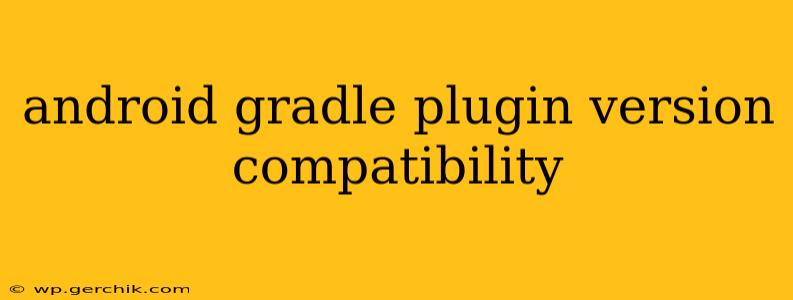The Android Gradle Plugin (AGP) is a crucial component for building Android applications. Keeping it up-to-date is essential for accessing the latest features, performance improvements, and bug fixes. However, maintaining compatibility between the AGP version, Gradle version, and your project's dependencies is critical to avoid build errors and ensure a smooth development process. This guide will delve into the complexities of Android Gradle Plugin version compatibility, helping you navigate the sometimes-tricky waters of version management.
What is the Android Gradle Plugin?
The Android Gradle Plugin is a build system plugin that integrates Gradle (a general-purpose build automation system) with the Android SDK. It provides tasks and configurations specifically tailored for Android app development, such as compiling code, packaging resources, and signing your APK. Understanding its role is fundamental to understanding version compatibility.
How to Check Your Current AGP Version
Before making any changes, it's crucial to know your current AGP version. You can find this information in your project's gradle/wrapper/gradle-wrapper.properties file (look for the distributionUrl line) and in your module-level build.gradle file (inside the plugins block).
Understanding AGP Version Compatibility with Gradle
The AGP version is closely tied to a specific range of compatible Gradle versions. Using an incompatible Gradle version will lead to build failures. The official Android documentation always specifies the compatible Gradle versions for each AGP release. Always consult the official documentation for the most up-to-date compatibility information. Ignoring this can result in frustrating build errors and wasted debugging time.
Finding Compatible Gradle Versions
The best way to find the correct Gradle version is to check the official Android developer website's release notes for your target AGP version. They clearly list the compatible Gradle versions. Using the wrong Gradle version will often lead to errors such as "Plugin with id 'com.android.application' not found."
Common AGP Version Compatibility Issues and Solutions
Several common issues arise from AGP version incompatibility. Let's explore some of the most prevalent problems and their solutions:
1. "Plugin with id 'com.android.application' not found."
This error indicates that Gradle can't find the Android application plugin. This usually means you have an incompatible AGP and Gradle version combination. The solution is to check the official documentation for the correct Gradle version for your AGP and update your gradle-wrapper.properties file accordingly.
2. Dependency Conflicts
Using outdated AGP versions can create conflicts with newer dependencies. Updating the AGP often resolves these conflicts. However, carefully review the release notes for any potential breaking changes that might require adjustments to your code or dependencies.
3. Build Speed and Performance
Older AGP versions might lack performance optimizations present in newer versions. Upgrading can lead to significant improvements in build times, particularly for larger projects.
How to Update the Android Gradle Plugin
Updating the AGP involves modifying your project's Gradle files. The process is typically straightforward:
-
Update
gradle-wrapper.properties: Change thedistributionUrlto point to the correct Gradle version compatible with your desired AGP version. -
Update
build.gradle(Project Level): Ensure theclasspathdependency for the Android Gradle Plugin is updated to the desired version. -
Update
build.gradle(Module Level): In thepluginsblock, update theidto the new plugin version. Or if you are usingdependenciesinstead ofpluginsfor this version, you should change to usingplugins.
Example: To update to AGP 8.0.0, you might need to change gradle-wrapper.properties to point to Gradle 8.0, and your module-level build.gradle to something like:
plugins {
id 'com.android.application' version '8.0.0' apply false
id 'com.android.library' version '8.0.0' apply false
}
Remember to always consult the official Android documentation for the most accurate and up-to-date instructions for your specific situation. Always back up your project before making significant changes.
Staying Up-to-Date
Regularly checking for updates is crucial. Subscribe to the Android Developers blog and release notes to stay informed about new AGP releases and compatibility changes. This proactive approach will help minimize potential build issues and ensure you always have access to the latest features and performance enhancements.
By understanding the intricacies of AGP version compatibility and following the best practices outlined above, you can significantly improve your Android development workflow and avoid common pitfalls. Remember that staying updated is key to a smooth and efficient development process.
